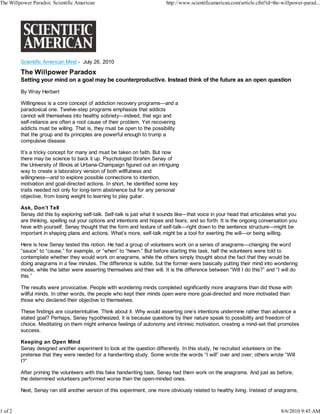
The willpower paradox scie..
- 1. The Willpower Paradox: Scientific American http://www.scientificamerican.com/article.cfm?id=the-willpower-parad... Scientific American Mind - July 26, 2010 The Willpower Paradox Setting your mind on a goal may be counterproductive. Instead think of the future as an open question By Wray Herbert Willingness is a core concept of addiction recovery programs—and a paradoxical one. Twelve-step programs emphasize that addicts cannot will themselves into healthy sobriety—indeed, that ego and self-reliance are often a root cause of their problem. Yet recovering addicts must be willing. That is, they must be open to the possibility that the group and its principles are powerful enough to trump a compulsive disease. It’s a tricky concept for many and must be taken on faith. But now there may be science to back it up. Psychologist Ibrahim Senay of the University of Illinois at Urbana-Champaign figured out an intriguing way to create a laboratory version of both willfulness and willingness—and to explore possible connections to intention, motivation and goal-directed actions. In short, he identified some key traits needed not only for long-term abstinence but for any personal objective, from losing weight to learning to play guitar. Ask, Don’t Tell Senay did this by exploring self-talk. Self-talk is just what it sounds like—that voice in your head that articulates what you are thinking, spelling out your options and intentions and hopes and fears, and so forth. It is the ongoing conversation you have with yourself. Senay thought that the form and texture of self-talk—right down to the sentence structure—might be important in shaping plans and actions. What’s more, self-talk might be a tool for exerting the will—or being willing. Here is how Senay tested this notion. He had a group of volunteers work on a series of anagrams—changing the word “sauce” to “cause,” for example, or “when” to “hewn.” But before starting this task, half the volunteers were told to contemplate whether they would work on anagrams, while the others simply thought about the fact that they would be doing anagrams in a few minutes. The difference is subtle, but the former were basically putting their mind into wondering mode, while the latter were asserting themselves and their will. It is the difference between “Will I do this?” and “I will do this.” The results were provocative. People with wondering minds completed significantly more anagrams than did those with willful minds. In other words, the people who kept their minds open were more goal-directed and more motivated than those who declared their objective to themselves. These findings are counterintuitive. Think about it. Why would asserting one’s intentions undermine rather than advance a stated goal? Perhaps, Senay hypothesized, it is because questions by their nature speak to possibility and freedom of choice. Meditating on them might enhance feelings of autonomy and intrinsic motivation, creating a mind-set that promotes success. Keeping an Open Mind Senay designed another experiment to look at the question differently. In this study, he recruited volunteers on the pretense that they were needed for a handwriting study. Some wrote the words “I will” over and over; others wrote “Will I?” After priming the volunteers with this fake handwriting task, Senay had them work on the anagrams. And just as before, the determined volunteers performed worse than the open-minded ones. Next, Senay ran still another version of this experiment, one more obviously related to healthy living. Instead of anagrams, 1 of 2 8/6/2010 9:45 AM
- 2. The Willpower Paradox: Scientific American http://www.scientificamerican.com/article.cfm?id=the-willpower-parad... he changed the goal to exercise; that is, he measured the volunteers’ intentions to start and stick to a fitness regimen. And in this real-world scenario, he got the same basic result: those primed with the interrogative phrase “Will I?” expressed a much greater commitment to exercise regularly than did those primed with the declarative phrase “I will.” What’s more, when the volunteers were questioned about why they felt they would be newly motivated to get to the gym more often, those primed with the question said things like: “Because I want to take more responsibility for my own health.” Those primed with “I will” offered strikingly different explanations, such as: “Because I would feel guilty or ashamed of myself if I did not.” This last finding is crucial. It indicates that those with questioning minds were more intrinsically motivated to change. They were looking for a positive inspiration from within, rather than attempting to hold themselves to a rigid standard. Those asserting will lacked this internal inspiration, which explains in part their weak commitment to future change. Put in terms of addiction recovery and self-improvement in general, those who were asserting their willpower were in effect closing their minds and narrowing their view of their future. Those who were questioning and wondering were open-minded—and therefore willing to see new possibilities for the days ahead. Further Reading Extreme Function: Why Our Brains Respond So Intensely to Exaggerated Characteristics Social Ties Boost Survival by 50 Percent Origins: Going Back to Where the Story Really Starts More Education Delays Dementia Signs--But Not Damage Two Sides of the Same Coin: Gym-bots and Obese People May Share the Same Brain Pathway A Change of Heart: Portable Power Source Lets Cardiac Patients Await a Permanent Donor at Home How Babies Think How Does Sewage Treatment Work? 2 of 2 8/6/2010 9:45 AM
